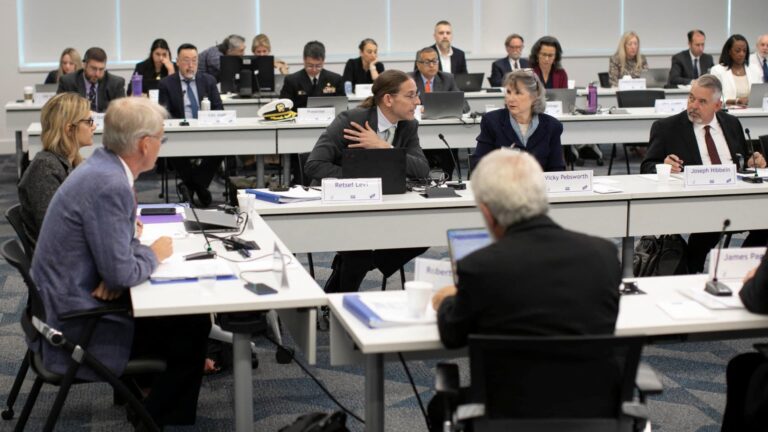Members of the Advisory Committee on Immunization Practices listen to a presentation about Covid-19 during an ACIP meeting at the Centers for Disease Control and Prevention in Atlanta, Sept. 19, 2025.
Alyssa Pointer | Reuters
Health and Human Services Secretary Robert F. Kennedy Jr.’s hand-picked vaccine panel on Friday weakened Covid shot recommendations in the U.S., advising that all Americans consult a health-care provider before deciding whether to receive the vaccine.
The panel, called the Advisory Committee on Immunization Practices, or ACIP, recommended that people 6 months and up receive vaccines based on so-called “shared clinical decision-making,” which refers to a decision process between a health-care provider and a patient or their guardian. The group also voted to emphasize that for those under 65, the Covid vaccine is most beneficial for those at high risk of severe illness from the disease.
The guidance breaks from previous years, where the committee recommended that all Americans ages 6 months and up receive an updated Covid shot.
While ACIP did not restrict the use of the Covid vaccine, the panel’s softer recommendation may further confuse Americans about whether to take a shot and make it more difficult for them to access one. ACIP sets recommendations on who should receive certain shots and which vaccines insurers must cover at no cost.
The panel’s chair, Martin Kulldorff, said it was his understanding that the new recommendation means that government-run insurance plans will still cover Covid vaccines. But it’s unclear if all private health plans will maintain coverage of the shots.
The CDC, whose latest director was ousted by the Trump administration earlier this month, still has to adopt the panel’s recommendations.
The vote is no surprise, as Kennedy appointed several vocal critics of mRNA Covid shots to the panel after ousting all previous members in June. During the meeting Friday, some members cast doubt on the safety and efficacy of Covid shots and mRNA technology, and questioned the reliability of data on hospitalization rates due to the virus.
Massachusetts Institute of Technology professor Retsef Levi speaks during an Advisory Committee on Immunization Practices meeting at the Centers for Disease Control and Prevention in Atlanta, Sept. 19, 2025.
Alyssa Pointer | Reuters
It also follows Kennedy’s other recent moves to change U.S. Covid vaccine policy, which have created new hurdles for some people to access vaccines, including prescription requirements in certain states. The CDC dropped Covid shot recommendations for healthy children and pregnant women, and the Food and Drug Administration approved new Covid jabs with limits on who can get them.
The ability to get vaccines may vary by state: In a break from federal guidelines, four Democratic states on Wednesday recommended that broad swaths of the population receive an updated Covid shot, including “all who choose protection.” Still, the new recommendations could weaken vaccination rates against the virus and heighten the threat of the disease spreading.
A study published Thursday in JAMA Network Open showed that sticking to a universal Covid vaccine recommendation in the U.S., the guidance that has been in place in recent years, has the potential to prevent thousands more hospitalizations and deaths than limiting the advisory to high-risk groups.
Numerous studies have demonstrated that shots using mRNA technology, including Covid vaccines from Pfizer and Moderna, are safe and effective, and serious side effects have happened in extremely rare cases. One paper in August estimates that Covid vaccines saved more than 2 million lives, mostly among older adults, worldwide between 2020 and October 2024.
In a statement Friday, Pfizer said the company and its partner BioNTech “remain steadfast in our dedication to vaccine safety, quality and effectiveness through constant safety monitoring and ongoing research.”
One major health insurance group on Wednesday said its member plans will cover all vaccines already recommended by ACIP, including updated Covid and flu shots, despite any changes the new slate of appointees makes this week. Member plans of the group, America’s Health Insurance Plans, collectively provide coverage and services to over 200 million Americans. That includes more than a dozen Blue Cross Blue Shield plans, Centene, CVS’ Aetna, Elevance Health, Humana, Kaiser Permanente, Molina, and Cigna.
Debating Covid vaccines
One ACIP member, Retsef Levi, a professor of operations management at the Massachusetts Institute of Technology, led a work group that reviewed data and proposed recommendations around Covid vaccines. Levi’s presentation on the group’s findings questioned the safety and efficacy of Covid shots and cast doubt on mRNA technology.
“We have a range of things on the mRNA platforms that really suggest that it doesn’t work as intended,” said Levi, who has previously pushed to stop giving mRNA shots.
He said the majority of the work group felt that individual decisions on whether to receive a Covid vaccine are “appropriate” and specifically, that people should now have to obtain prescriptions for the shot. “You get to a level of nuance” where some patients may have recent prior infections or different comorbidities that should be discussed with a physician as part of a prescription, Levi said.
But one work group member, Dr. Henry Bernstein, said during another presentation that “shared clinical decision-making and a need for a prescription creates barriers” to Covid vaccine access.
“Simple, stable recommendations can increase vaccine coverage,” said Bernstein, a professor of pediatrics at Zucker School of Medicine at Hofstra/Northwell. “Covid-19 vaccines are highly safe and effective.” He is not a member of Kennedy’s panel who votes on recommendations.
“Covid-19 vaccination matters for pregnant women, pediatric patients, especially those less than two years of age, people 65 years and older, those of any age with a weakened immune system, medical conditions, and anyone who feels they want protection for themselves or their families,” he said.

